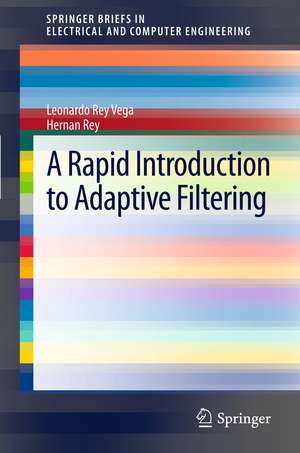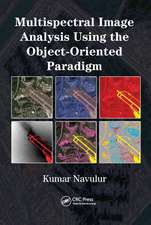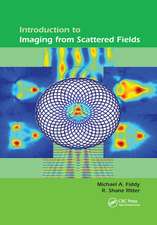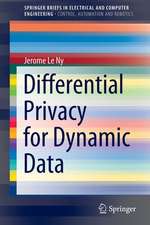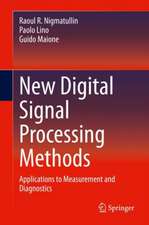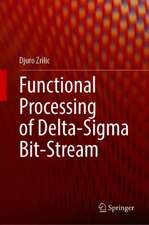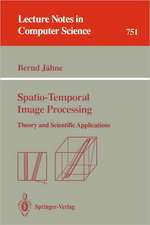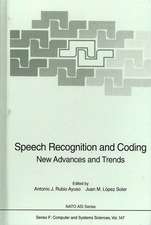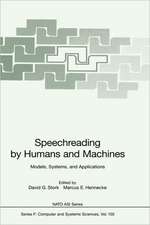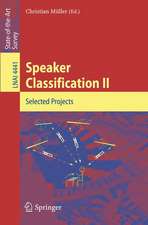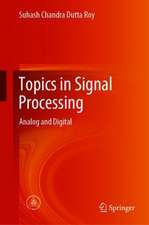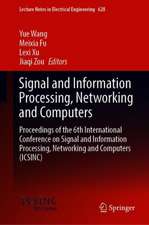A Rapid Introduction to Adaptive Filtering: SpringerBriefs in Electrical and Computer Engineering
Autor Leonardo Rey Vega, Hernan Reyen Limba Engleză Paperback – 4 aug 2012
Din seria SpringerBriefs in Electrical and Computer Engineering
- 19%
 Preț: 427.19 lei
Preț: 427.19 lei -
 Preț: 377.35 lei
Preț: 377.35 lei -
 Preț: 380.07 lei
Preț: 380.07 lei -
 Preț: 378.12 lei
Preț: 378.12 lei - 20%
 Preț: 379.08 lei
Preț: 379.08 lei -
 Preț: 377.18 lei
Preț: 377.18 lei - 20%
 Preț: 234.68 lei
Preț: 234.68 lei - 20%
 Preț: 232.43 lei
Preț: 232.43 lei -
 Preț: 378.12 lei
Preț: 378.12 lei -
 Preț: 377.18 lei
Preț: 377.18 lei - 20%
 Preț: 231.41 lei
Preț: 231.41 lei -
 Preț: 377.18 lei
Preț: 377.18 lei -
 Preț: 377.95 lei
Preț: 377.95 lei -
 Preț: 444.74 lei
Preț: 444.74 lei -
 Preț: 382.36 lei
Preț: 382.36 lei -
 Preț: 378.12 lei
Preț: 378.12 lei - 20%
 Preț: 232.43 lei
Preț: 232.43 lei -
 Preț: 376.80 lei
Preț: 376.80 lei -
 Preț: 377.35 lei
Preț: 377.35 lei -
 Preț: 377.18 lei
Preț: 377.18 lei -
 Preț: 381.00 lei
Preț: 381.00 lei -
 Preț: 376.43 lei
Preț: 376.43 lei -
 Preț: 377.18 lei
Preț: 377.18 lei -
 Preț: 378.54 lei
Preț: 378.54 lei - 20%
 Preț: 321.20 lei
Preț: 321.20 lei -
 Preț: 377.73 lei
Preț: 377.73 lei -
 Preț: 341.75 lei
Preț: 341.75 lei -
 Preț: 344.25 lei
Preț: 344.25 lei -
 Preț: 379.09 lei
Preț: 379.09 lei - 20%
 Preț: 324.64 lei
Preț: 324.64 lei -
 Preț: 377.57 lei
Preț: 377.57 lei -
 Preț: 378.71 lei
Preț: 378.71 lei - 20%
 Preț: 321.66 lei
Preț: 321.66 lei - 20%
 Preț: 230.85 lei
Preț: 230.85 lei -
 Preț: 374.30 lei
Preț: 374.30 lei -
 Preț: 375.45 lei
Preț: 375.45 lei -
 Preț: 360.05 lei
Preț: 360.05 lei -
 Preț: 381.43 lei
Preț: 381.43 lei -
 Preț: 378.34 lei
Preț: 378.34 lei -
 Preț: 376.22 lei
Preț: 376.22 lei - 20%
 Preț: 323.99 lei
Preț: 323.99 lei -
 Preț: 380.07 lei
Preț: 380.07 lei -
 Preț: 375.62 lei
Preț: 375.62 lei - 20%
 Preț: 321.20 lei
Preț: 321.20 lei -
 Preț: 377.18 lei
Preț: 377.18 lei - 5%
 Preț: 361.80 lei
Preț: 361.80 lei -
 Preț: 378.12 lei
Preț: 378.12 lei -
 Preț: 375.07 lei
Preț: 375.07 lei -
 Preț: 376.22 lei
Preț: 376.22 lei
Preț: 378.92 lei
Nou
Puncte Express: 568
Preț estimativ în valută:
72.50€ • 75.70$ • 60.01£
72.50€ • 75.70$ • 60.01£
Carte tipărită la comandă
Livrare economică 05-19 aprilie
Preluare comenzi: 021 569.72.76
Specificații
ISBN-13: 9783642302985
ISBN-10: 364230298X
Pagini: 100
Ilustrații: XII, 122 p. 23 illus.
Dimensiuni: 155 x 235 x 20 mm
Greutate: 0.2 kg
Ediția:2013
Editura: Springer Berlin, Heidelberg
Colecția Springer
Seria SpringerBriefs in Electrical and Computer Engineering
Locul publicării:Berlin, Heidelberg, Germany
ISBN-10: 364230298X
Pagini: 100
Ilustrații: XII, 122 p. 23 illus.
Dimensiuni: 155 x 235 x 20 mm
Greutate: 0.2 kg
Ediția:2013
Editura: Springer Berlin, Heidelberg
Colecția Springer
Seria SpringerBriefs in Electrical and Computer Engineering
Locul publicării:Berlin, Heidelberg, Germany
Public țintă
Professional/practitionerCuprins
Wiener Filtering and examples.- Steepest descent procedure.- Stochastic gradient adaptive filtering: LMS (Least Mean Squares), NLMS (Normalized Mean Squares).- Sign-error algorithm, APA (Affine Projection Algorithms).- Convergence results.- Applications.- LS (Least Squares) and RLS (Recursive Least Squares).- Computational complexity and fast implementations.- Applications.
Recenzii
From the reviews:
“Digital signal processing (DSP) is a popular course for undergraduate students in electrical and communications engineering. … This book can be read in a few days. The book has six chapters, including a chapter each for an introduction and advanced topics. The presentation is easy to read and understandable, and the authors provide both theoretical and mathematical treatments of the material. … The book could also serve well as a quick reference for engineers and students who are developing DSP solutions.” (S. Ramakrishnan, ACM Computing Reviews, December, 2012)
“Digital signal processing (DSP) is a popular course for undergraduate students in electrical and communications engineering. … This book can be read in a few days. The book has six chapters, including a chapter each for an introduction and advanced topics. The presentation is easy to read and understandable, and the authors provide both theoretical and mathematical treatments of the material. … The book could also serve well as a quick reference for engineers and students who are developing DSP solutions.” (S. Ramakrishnan, ACM Computing Reviews, December, 2012)
Textul de pe ultima copertă
In this book, the authors provide insights into the basics of adaptive filtering, which are particularly useful for students taking their first steps into this field. They start by studying the problem of minimum mean-square-error filtering, i.e., Wiener filtering. Then, they analyze iterative methods for solving the optimization problem, e.g., the Method of Steepest Descent. By proposing stochastic approximations, several basic adaptive algorithms are derived, including Least Mean Squares (LMS), Normalized Least Mean Squares (NLMS) and Sign-error algorithms. The authors provide a general framework to study the stability and steady-state performance of these algorithms. The affine Projection Algorithm (APA) which provides faster convergence at the expense of computational complexity (although fast implementations can be used) is also presented. In addition, the Least Squares (LS) method and its recursive version (RLS), including fast implementations are discussed. The book closes withthe discussion of several topics of interest in the adaptive filtering field.
Caracteristici
Presents a rapid introduction to the fundamentals on adaptive filtering Discusses several modern topics in the adaptive filtering field Includes supplementary material: sn.pub/extras
